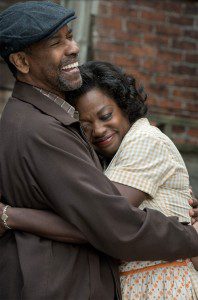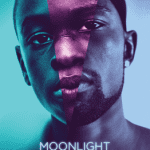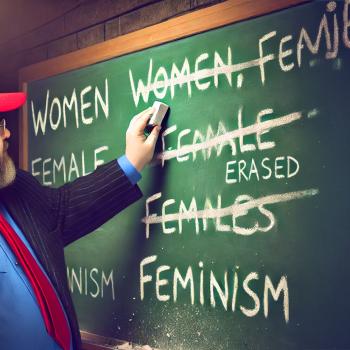
I knew nothing about FENCES when we walked in except that its connection to Denzel Washington. Nothing. Perhaps a bit of research would have helped/ Probably most of those who will see it will be like us: ordinary movie-goers, not necessarily well-versed in Broadway stage hits written by writers from the 80’s.
What we saw was a fascinating, troubling, occasionally mind-numbing intimate glimpse into a black, lower-middle class family in 1950’s Pittsburg.
Most of the action takes place in the small, cluttered backyard of an aging brick house with a fence in progress. Washington’s character, Troy Maxon, and his wife, Rose, portrayed the incredible Viola Davis, own the house.
Characters get minimal introduction–it took a lot of attention to figure out who was related to whom and how. Their stories unfold slowly through extensive dialogue. Key factors that have shaped them as people don’t surface until well into the movie. All springs from the film’s origins as a Pulitzer Prize-winning play authored by August Wilson.
Troy initially comes across as a charming, responsible, funny story-teller, clearly in love with his wife, Rose. Soon we discover that, just as clearly, he has tense, pissing contest-type relationships with a grown musician son, Lyons, and his football-playing high school son, Cory. Two other characters, Troy’s severely brain-damaged brother, Gabriel and a long-time friend, Bono, make up the cast.
Deep into the film, we learn that Troy, growing up with as one of eleven children with an absent mother and a truly mean, nasty father, spent 15 years in prison for manslaughter. As a result, he missed all the early years of his first son. Troy’s life disappointments keep him blind to the real possibilities for Cory, ultimately bringing the tension between them to the breaking point
Inch by inch, Troy’s dark side emerges, his need to be king in his home, his illiteracy, his mean streak, his rejection of anything that might disturb his understanding of how the world works. Finally, we learn that he has a girlfriend on the side.
Rose plays his foil expertly, both loving him and hating what he has done to her and her sense of self. She stands firmly on the side of their son, Cory. He is on the verge of winning a football scholarship and leaping into a much bigger life than Troy could have ever envisioned. However, Cory must also get his father’s permission to move forward.
As for the title, FENCES: a unifying metaphor through the movie is the tortuously slow build of a backyard fence Rose has requested. Much of the action revolves around the saw and sawhorses.
Monologues explore the meaning of the fence–is it to keep fears out or to keep people in?
The acting is beyond superb. Rose’s internalized agony grips the viewer. We want to be sympathetic to Troy because he moved far from the horrors of his background. By unrelenting hard work and extreme care with money, all tinged by the high barriers of the racist world he lives in, he provides for his family. But when Rose pronounces him a “womanless man,” the audience in our viewing cheered.
Summary
FENCES will give you much to consider.
- A decided rejection of the idea that the sins of the father are necessarily passed on to the children provides a strong moral anchor.
- The economic challenges of a black family in a white-ruled world provide a subtle sub-text that is worth exploring more fully.
- The life of a woman who is occasionally hurt, and hurt deeply, by her husband but who chooses to stay could and should open conversations about the real nature of marriage and the commitment two people make when they enter into it.
The film did seem slow at times, but that slowness was necessary for the rich character development that it provides. Rarely in today’s film world is the complex inner life of the characters so expertly exposed.
It’s power sticks with you. It’s unanswered questions ask us all to look more carefully at ourselves.
Yeah, see it.
The PG-rated Paramount Pictures film, directed by Denzel Washington, opens in wide release on Monday, December 25, 2016.

















